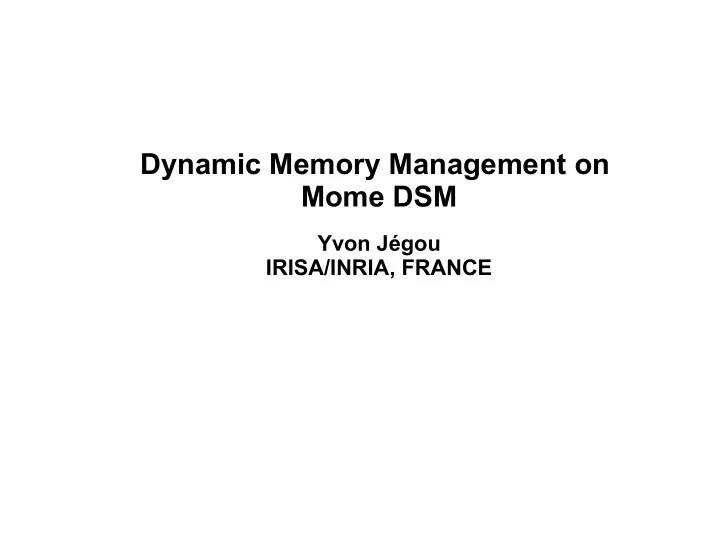

Dynamic Memory Management on Mome DSM Yvon Jégou IRISA/INRIA, FRANCE
● Introduction ● Goals ● Basic implementation ● Current work
Why ? ● Few DSM implementations provide a global shared memory management ● Must be provided by applications ● Problem: ● portability of sequential codes (libraries) ● needed for OpenMP
OpenMP on clusters ● Everything is implicitly shared ● Stacks are shared ● Dynamically allocated memory is potentially shared ● Load balancing through worker migration: private data need to be shared
Key goals ● No penalty for private (local) memory management ● Symmetry ● Balanced / Unbalanced loads ● Scalability (hundreds of nodes) ● Efficiency
Basic implementation ● Two levels ● Top level: shared management of large blocks ● Low level: local management of small blocks
Top level ● Global management protected by global mutex lock ● Top-level metadata in a shared DSM segment ● Current 32 bit implementation: blocks >4Mbytes handled at top level
Low level ● Arena: a list of top-level blocks (heaps) ● Memory allocation inside arenas – glibc malloc/free in our implementation ● Each arena managed by a single node – can have multiple arenas/node to reduce contention inside the node ● All consistency models
Arena/heap creation ● Initialization: empty arena list ● First malloc: – request heap from top level – create first arena in heap ● On malloc, if free space exhausted in arena – request extra heaps from top level and extend arena ● Contention on access to arena (SMP) – switch to another arena (if possible), or – create a new arena and switch allocations to this arena
Symmetry: free ● free can be requested from all nodes ● free (addr) – addr belongs to a local arena: handled locally – addr is not local: send addr to its manager node ● We need efficient handling of block ownership
Lock-free implementation of ownership ● Heap: fixed size 2^h ● Heap addresses: ( ha ) aligned on 2^h boundary ● Heap Id: ha>>h. All addresses from same heap have same Id. ● Ownership vector – owner[Id]==valid node number node management – owner[Id]==GLOBAL global management – owner vector located in DSM shared space ● updated during heap allocation (and deallocation): atomic ● read during free request: atomic
Efficiency considerations ● Need for global lock: reduced to big block and heap management ● Symmetrical management ● Efficient private memory management ● Efficiency measure: #page faults during memory management
Page faults ● Top level (32 bits implementation): – 256 big blocks (max): top-level metadata in one single DSM page – owner vector: one DSM page – big block alloc/free: one page-fault (max) – heap alloc/free: two page-faults (max), more expensive ● Low-level – heap allocation (not frequent) – free operation: ownership test (few page faults) – false-sharing between glibc metadata and user data (frequent on small blocks)
Global performance ● Highly dependent on metadata/data false sharing ● OpenMP on HPC numerical codes: performance is OK ● High stress (frequent small malloc/free + data sharing): performance limited by false-sharing. ● False-sharing reduction – highly dependent on the DSM – current work – separate metadata from data ?
Current work ● On the DSM – move to full 64 bits support – support for hundreds of nodes (hierarchical) – improve support for ● multiple memory consistency models ● multiple views of shared space
Current work on the memory allocator ● Use multiple views of the shared space – metadata and data in different views of the shared space ● Consistency of metadata view: (very) weak – modifying metadata does not invalidate the page on other nodes – modifying user data does not invalidate metadata view
Conclusion ● Still a lot of work...
Recommend
More recommend